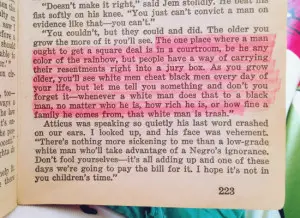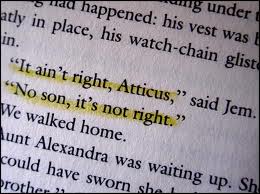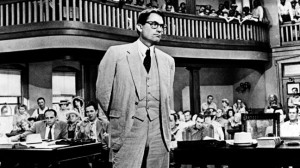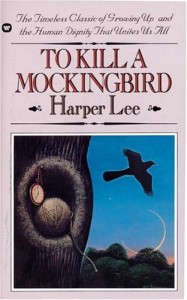by Jas Faulkner
Where there used to be lots of chatter and lots of speculation with just enough nuggets of truth to keep people listening and wondering, now there are memes. Whenever something big happens, there are always quotes pulled from primary sources closest to the event, movies, TV shows, and yes, books. There is a sameness to this. We expect to hear from the heroes and the villains who are directly involved and the pop culture voices that seem to have some ancillary connection and it all starts to run together in a big, colorful, smeary heartfelt collage of words in boxes.
When the verdict for the Trayvon Martin case hit the internet, it didn’t take long for the situation to be distilled from news stories and thoughtful (and less so) essays to bits of information set in artful fonts that were then scattered all over Facebook, Google+, and Tumblr. Given the sum of the parts: race, the South, and the situation being a lightning rod for everyone’s feelings about the bigger issues, it came as no surprise that someone would look to Harper Lee’s masterpiece, To Kill A Mockingbird, to find out what that most noble of deep south activist lawyers, Atticus Finch, had to say.

This time, with this event, there are some differences. The boxes that are shared have less to do with slick graphic design and more to do with the handheld, handmade protest that comes with finding the words that speak to us and sharing them straight from the hand and heart. More of these quotes are showing up as photographs of pieces of paper with Lee’s words written by hand or pictures of pages of books with the relevant passages highlighted.
Okay, this might seem like a detail. Remember what advertising folk say about details? God (or the Devil, depending on who you ask) is in the details.
The handmade look to these net memes indicates there is a deep need to personalize our connection with the source material and with each other. In the past, we exchanged ideas about the events of the day in coffee shops and churches/temples/mosques/synagogues and barber shops and the local markets. Books and newspapers were shared, their most important words underlined and sometimes marked with a fold for easy reading.
 We have a lot less of that now, but the need to play that grownup version of show and tell has not gone away. The source material with it’s finely drawn portrait of childhood, comforting arcana of caring adults, and morality that overlays sharp delineations of right and wrong over real life’s more complicated shades of gray is a book that nearly every adult holds as a special part of their reading history. It is comforting both in its familiarity and the sureness of purpose the people in Lee’s characters employ.
We have a lot less of that now, but the need to play that grownup version of show and tell has not gone away. The source material with it’s finely drawn portrait of childhood, comforting arcana of caring adults, and morality that overlays sharp delineations of right and wrong over real life’s more complicated shades of gray is a book that nearly every adult holds as a special part of their reading history. It is comforting both in its familiarity and the sureness of purpose the people in Lee’s characters employ.
Lee’s Scout may tell the tale, but the heart of the book is her father, Atticus Finch. He is present throughout the book as both the story’s hero and the moral compass and emotional home for Scout and her brother, Jem. He is who we the readers take away as the best part of Lee’s corner of humanity long after we’ve forgotten about Scout wrangling the ham costume or Boo Radley’s heroism.
We internalize Atticus in an entirely different way than we do any of the other characters however their circumstances reflect our own. He is the giant many of us saw in our own fathers. As parents and adults who are charged with the advocacy and care of others, he is who we want to be. For trial lawyers, those who take on guardian ad litem work, and those who work with public poverty legal cases, he is that vocational ideal that can be the boon and the bane of the profession.
Mark Papantonio, the author of In Search of Atticus Finch, had this to say about Lee’s almost superheroic lawyer:

“The lawyer that Harper Lee created and named Atticus Finch has been admired by most of us for decades. He does not suffer from “time famine.” It never appears that he is even close to “burnout.” The way he lives and lawyers does not incite his neighbors to engage in lawyer bashing. His family and friends are no less important to him than his law practice. He is a great teacher with lessons that require our attention.
Harper Lee’s fictional lawyer of the 30s’ demonstrates qualities that are still relevant for lawyers in the 90s’. Atticus Finch teaches us that excellence in conduct and purpose is praised in all time and all places. The Greeks call this quality of excellence arete.
Translated as “virtue,” it is a devotion of duty to oneself and a standard of striving in excellence in all things. The way this fictional character lives emphasizes the truth that there is virtue in lawyering.”
It is arguable that the more upsetting details of the Trayvon Martin case are what drive many of us to seek the familiar, comforting words of Atticus Finch. There were no heroes among the counsel on either side and we desperately need to know that the virtue Papantonio refers to still exists. So we call on the shade of a creation of words and celluloid to comfort us with the mythic wisdom. This is possibly why Lee’s words for Atticus are being passed around the internet like mash notes. Their gentle message in the face of so much rage serves as a reminder that we can be good and that in the end, even when the price is dear, good can prevail.


